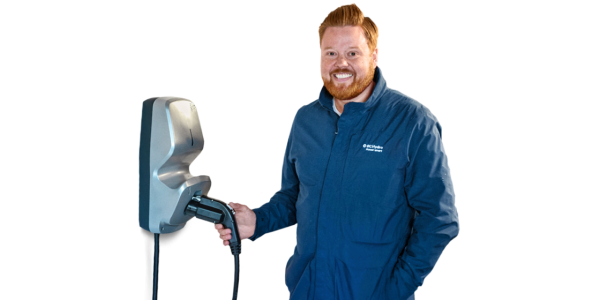Understand charger levels and features
Whether you're purchasing an electric vehicle (EV) charger to install at home, or you're powering up your vehicle at a public charging station, it's important to understand the different levels of chargers available.
If you're shopping for a charger for your home or business, there are lots of manufacturers and models to choose from. Be sure to select a charger that's safety certified, and consider having it installed by a licensed electrical contractor.
Electric vehicles (EVs) require a connection to an electrical system to charge. There are three different methods.
The 3 levels of chargers
Watch: Home charging 101
Curious about charging an EV home? Dave helps you navigate your options.
Home EV charger features
Wondering which EV charger type is right for you? Consider the EV charger features below to make sure your selected model will accommodate your vehicle(s), the space and your preferences.
Features related to your vehicle(s)
Connector
Most EVs have the "J plug" (J1772) which is used for home and Level 2 charging. For fast charging, there are two plugs: the "CCS" used by most manufacturers including BMW, General Motors and Volkswagen, and the "CHAdeMO" used by Mitsubishi and Nissan. Tesla has the North American Charging Standard (NACS) plug, but can use the "J plug" or "CHAdeMO" with adapters.
Single or dual port
Select chargers are available with two plugs, some of which allow two vehicles to charge at the same time if there's sufficient electrical capacity.
Features related to your space
Cord length
Cords are available in a range of lengths, the most common being 5 metres (16 feet) and 7.6 metres (25 feet). Shorter cables are easier to store but longer cables provide flexibility in the event drivers need to park further from the charger.
Indoor or outdoor
Many chargers are designed to function inside or outside, but not all are. If your charging station needs to be outside, make sure the model you choose is rated to work in the rain, snow, and cold temperatures.
Portable or permanent
Some chargers only need to plug into an outlet while others are designed to be installed on a wall.
Features related to your preferences
Amperage
Level 2 chargers are available in models that deliver between 15 and 80 Amps. The higher the amperage the faster the charging.
Networked
Some chargers will connect to the internet so drivers can start, stop, and monitor charging with a smartphone.
Smart EV chargers
Smart EV chargers ensure the most efficient charging by automatically adjusting the amount of electricity being sent to an EV based on timing and load factors. Some smart EV chargers can also provide you with data on your usage.
EV charger rebates
Rebates are available to help homes and workplaces across B.C. get ready for electric vehicles (EVs). The program is funded by the Government of B.C. and administered by BC Hydro and FortisBC.
Find out more about B.C.’s EV charger rebate program, eligibility and how to apply.
Wondering where to buy an EV charger? An electrician can help you choose a specific model that will meet your needs.
Ready to start shopping?
If you want to participate in the rebate program, make sure you choose an EV charger that meets eligibility criteria.
Electrical considerations
Things you need to know about your electrical service
- How much current (amperage) will the EV need to charge?
- What is the capacity of your existing electrical service panel (e.g., 100-Amp, 200-Amp, etc.)? Note that a 400-Amp service panel is considered an "uncommon upgrade". Learn more about electrical service extensions.
- Is there a 240V circuit installed and available to be used?
- Is there room in the electrical service panel for a new double-pole 240V circuit breaker?
- Where will the charging station be installed?
How an electrician can help
- Upgrading your service is often not required when adding an EV charger. Speak with your electrical contractor about how they determine the spare electrical capacity at your home.
- We recommend they use your most recent 12 months of actual meter data to assess your spare electrical capacity instead of the traditional approach, which uses a forecasted estimate.
- You can download your most recent 12 months of meter data by logging into your MyHydro account.
- If you do need a service upgrade, your electrician will manage that process for you. Learn more about the online application process for electrical service connection requests.
If you need help finding a certified electrician, you can submit a request here.


